#welcome back to another episode of me inflicting pain upon my character
Text
me and acid’s friendship dynamic in a nutshell

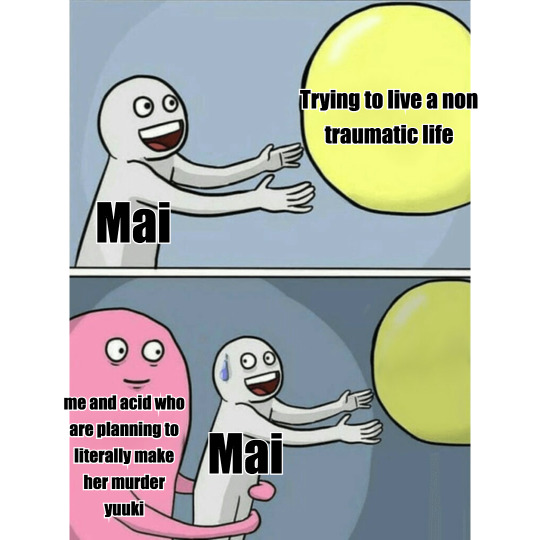
#meme#kny oc#kny oc meme#welcome back to another episode of me inflicting pain upon my character#kny#demon slayer oc
5 notes
·
View notes
Note
I’m not good at explaining my thoughts, but can you debunked the whole Jet and Zuko are bad boys claims? People always say this to keep others from shipping jetara and/or zutara or when they want to trash talk Zuko and Jet characters.
Thanks for the ask and I’m sorry it’s taken me a while to answer it! To be completely honest, I’m not great at articulating my thoughts too 😅. However, I’ll try to answer this question as best as I can (given it’s 1am and I get rambly at this hour).
Before we get into the Jet/Zuko discussion, we need to define what a “bad boy” is, because there’s many different interpretations of the term. For this ask, I’ll be using the definition of the bad boy archetype from this site:
The Bad Boy is someone who hides. Something has happened to them in the past or currently is affecting them and they deal with it by putting up an armor around themselves. This armor protects them for those around them who might be able to see who the real them is. The Bad Boy wants to hide away but he must open up to reveal himself... the Bad Boy doesn’t purposely hurt people to make them feel his pain. He rebels instead of living the life he once did. But unlike the Rebel, he doesn’t truly have a cause for his rebellion. He wants to be heard through his rough exterior without being seen.
So I’m going to start off with Zuko, because I’m much more comfortable talking about his character. And this is primarily because Zuko was one of the main characters of the show and didn’t die at the tail end of season 2.
Honestly, I can never understand how Zuko is perceived as a “bad boy” by so many people. I mean, the only time when I can agree that Zuko’s character could somewhat be interpreted as a “bad boy” is during the first half of season 3. Yes, you read that correctly. Season 1 Ponytail Zuko was not a bad boy; he was a homesick, abused 13 year old child trapped in the body of an angsty 16 year old. Season 1 Zuko might have been angsty and broody, but have you ever met a teenage boy? He never even really rebelled. I mean, sure, he did some things that Iroh frowned upon but in Zuko’s mind, he’s still a prince of his nation—banished or not—and he still holds himself to the standards of a prince. The only time that I think he truly rebels is by becoming the Blue Spirit, but even then, he had a cause for donning that mask.
The only episode that I think shows Zuko in a “bad boy” light is the 5th episode of season 3, The Beach. This is when his angst and broodiness reached an all-time high, and he constantly lashed out at Mai, Ty Lee, and Azula for no reason. The episode eventually culminated in a confrontation reminiscent of The Breakfast Club, Zuko’s honesty with himself, and a dramatic “I’m angry at myself!” line, which are all hallmarks of a bad boy character arc. However, this is just one episode out of 61 and solely focusing on one episode to analyze this guy’s character is an insult to Zuko’s redemption arc that spanned the entirety of 3 seasons.
Another reason why Zuko isn’t a bad boy is that he doesn’t do bad things to get attention. Nothing that he does is a plea for help. The “bad” things that he does aren’t bad in his mind. Capturing the Avatar is just something that he needs to do in order to get his father to love him and welcome him back home. If anything, Zuko is just a misguided person with messed up morals that were instilled in him from a very young age. Zuko has a purpose for everything that he does, and usually this purpose is his sense of righteous anger. Both times Zuko confronted Ozai and rebelled against him, Zuko knew that what his father was doing was wrong. Zuko rebelled against those Earth Kingdom soldiers in Zuko Alone because he felt like he needed to stand-up for Lee and his family. And Zuko didn’t pick a fight with Zhao just because he felt like it. He fought Zhao because that guy had personally insulted Zuko, a prince, and his honor. And Zuko could have burned Zhao at the end of that fight, but he didn’t. He already proved himself to Zhao. Zuko has compassion, and shows it to people that don’t deserve it (e.g. in the Siege of the North, Zuko tried saving Zhao from the Ocean Spirit).
And the most important reason why Zuko isn’t a bad boy is because of his redemption arc. By the end of the show, he’s developed many strong friendships and makes an effort to be open and socialize with others. He’s not afraid to share his thoughts and emotions with others. He trusts people. He’s less broody and smiles more often. He acknowledges that he’s done bad things in the past and asks for forgiveness and makes amends. Are these qualities of a bad boy? I think not.
As for Jet, I think he fits the description of a bad boy pretty well. He’s aloof, hot, and angsty. He’s quite dangerous with a pair of hook swords in his hands. He smokes cigarettes He chews on a piece of wheat to be “edgy”. He’s done questionable things like drown a village full of innocent people. He deceives people to get what he wants. He has all of the traits of any popular male protagonist from a published Wattpad “novel”.
However, I don’t consider Jet a “bad boy” because he has a specific cause for his rebellion. Most bad boys participate in petty crimes like shoplifting or vandalism just because they can. Jet? Jet rebels against the Fire Nation because he’s witnessed their destruction first-hand. He lost his parents from an attack by the Rough Rhinos, and he saw his village burn to ashes right in front of him. He actively tries to destroy a system that he thinks can only inflict pain on others. And what does he do with the people (mostly young children) that have lost their homes because of Fire Nation attacks? He takes them in and acts as a surrogate-father-of-sorts. He forms a community with these people, bonds with them, shares meals together, and secures supplies for them. He’s in charge of their well-being and makes sure that everyone is ok. And these people look up to him as a leader and a central part of their family. So Jet? A bad boy? I don’t think so.
Calling Zuko and Jet “bad boys” are terrible misrepresentations of their characters, and if you think they fall under the bad boy archetype, I would suggest a deeper look into their respective character arcs.
As a final note, I’d like to address the shipping aspect of this ask. After being in this fandom for about 3 years, I’ve seen my fair share of Zutara and Jetara fics that have played off of this bad boy/good girl dynamic. And to be completely honest, I don’t think there’s an inherent problem with liking a dynamic like that. I mean, it’s not an accurate portrayal of the characters, but I won’t discourage people from shipping something or creating fan content because they like a certain trope.
#ask#i attempted to answer something#sorry for the giant wall of text#hope this helps!#zuko#jet#atla#drunktextin#again i'm sorry if this is one incoherent babble#i'm very sleep deprived lmao
35 notes
·
View notes
Text
A Buffy rewatch 6x22 Grave
aka doesn’t matter i still love you
Welcome to this dailyish (weekly? bi-weekly?) text post series where I will rewatch an episode of Buffy and go on an impromptu rant about it for an hour. Is it about one hyperspecific thing or twenty observations? 10 or 3k words? You don’t know! I don’t know!!! In this house we don’t know things.
And today’s episode is easily the most unconventional season finale of the show (excluding Restless, which is more of a bonus episode). Buffy doesn’t defeat the Big Bad. Or... does she?
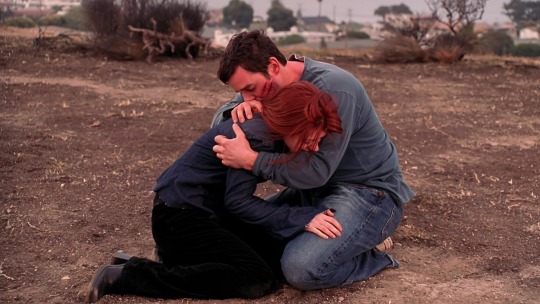
Fun fact, Grave is the only season finale that wasn’t written by Joss Whedon. Well, depending on whether you count Primeval or Restless as the finale of season 4, since the former was also penned by David Fury instead of Whedon.
But this episode has many other distinctions as well. It comes at the heels of an already subversive season, that was meant to deconstruct the very structure of the show, as well as its characters.
Deconstruction however is tough. If you don’t do it well, your audience will rightfully call you out on needlessly pulling your story in an often darker direction to seem fake deep or interesting.
And I feel like season 6 has plenty of criticisms on that front. This certainly wasn’t one of my favorite seasons on my first, or even second go at it. It’s hard seeing characters you love hurting and acting against their own self interests. It’s even harder to see them hurt each other.
This time around however, I wanted to not only look past those previous misgivings I had, but appreciate them and what they mean to the story. Because truth be told, I’m not sure season 6 is actually more flawed than any other season of Buffy.
That doesn’t mean that there aren’t issues – Willow’s drug addiction metaphor was pushed way too hard and took away from the themes of power and control surrounding her narrative for one –, but every season has its hurdles and strengths. Season 2 had an excellent arc, but a lot of confusing fillers. Season 4 meanwhile had great standalones, but a weak overall Big Bad. Every season had its missteps, and a lot of those are subjective to begin with. One girl’s Go Fish is anothers Beer Bad.
There are no wrong answers on this quiz.
So yeah, I went into season 6 not only knowing what to expect, but expecting to gain a new, more favorable perspective on it. And that’s more or less what I got.
Sure, there are things to criticize. But what I’ve been enjoying about this Buffy rewatch in particular, is the opportunity to write long paragraphs of nonsense rather than just saying “Thing Bad”.
Look at Tara’s death. I am perpetually ready to fight Joss Whedon over that in a parking lot, but it also gave us one of the most memorable examples of a hero going dark. And people’s been coming up fixes to that storyline for years (Xander being the one to die is a popular alternative among some fans, but also time travel if you go by fanfics), but it only goes to show that that story itself still worked.
…it’s just that it works in a horrible cultural context that’s rightfully criticized for perpetuating harmful notions, especially for some of the most vulnerable of our population, and the role of media in our society as both a reflection and a model can’t be ignored and should be discussed in order to call attention to these patterns.
Anywho. Grave.
As mentioned before, this is a rather unconventional season finale. Buffy doesn’t even get to fight the Big Bad, aka Willow in this one. Instead the initial showdown happens between Giles and Willow, at least up until the moment Willow breaks free.
That doesn’t mean that Buffy doesn’t fight though. She runs to save Dawn and Xander (and also Jonathan and Andrew I guess), and then when she gets stuck underground with Dawn, she fights to get out. And then she fights some magic zombie skeletons.
More importantly though, Buffy fights her own depression. She’s fighting to see that beauty and meaning in life that she failed to convince Willow of in the last episode.
She even talks to Giles about this. She tells him that she doesn’t understand why she’s here, why she’s alive, and Giles’s response of how she has a calling feels unsatisfying.
Others would’ve taken her place. She was done.
Then why is she here now?
And Giles doesn’t have an answer to that. Because they both know that there isn’t one. There isn’t a purpose to life, no all-encompassing explanation. We all have to find our own answers to get us through the day.
And by the end, Buffy finds hers in Dawn. Seeing life through her eyes, her future, the many things that’s yet to come. It’s arguably a bit clumsy, and I wish we built more on this theme between Buffy and Dawn this season, but it does tie into another aspect of the episode.
While season 6 in itself is a deconstruction of the show, this finale, and Buffy’s arc in particular, is clearly a subversion of the end of season 5. And in true Buffy fashion, a very unsubtle one at that.
In The Gift, the sun coming up marked the turning point for Buffy, the realization that she can save Dawn by sacrificing herself.
In Grave, the sun comes up right after Giles confirms that Willow’s going to end the world.
In the season 5 finale, Buffy jumps to her death. At the end of season 6, she crawls out of the ground to live.
I could go on, but you get my point.
This is also just a great moment for Dawn, as she interrogates Buffy on why she didn’t tell her what Spike did, and reminds Buffy how she can’t protect her from the world. Tragedy happens either way.
BUFFY: “Dawn, I'm trying to protect you.”
DAWN: “Well, you can't! Look around, Buffy. We're trapped in here! Willow's killing and people I love keep dying! And you cannot protect me from that.”
At the center of it all though is Willow. I’ve already been through the broad strokes here; basically, Willow’s rampage is about avoiding feeling her pain and grief.
And Giles understands that. I absolutely love Anthony Stewart Head’s performance in this one; Giles is focused and cautious, but there’s also genuine pain and concern in his expression as he’s talking to Willow. I also love this exchange around the end of their fight:
GILES: “Your powers may be undeniably greater. But I can still hurt you if I have to.”
WILLOW: “Boy, you just don't get it, do you? Nothing can hurt me now. This? *heals a cut on her face* Is nothing. It's all... nothing.”
GILES: “I see. If you lose someone you love, the other people in your life who care about you become meaningless. I wonder what Tara would say about that.”
Yup. Giles definitely knows how to hurt Willow. Willow’s line of “it’s all… nothing” is also a lot, especially that little melancholic tint that Alyson Hannigan delivers it with.
But apparently this was all part of Giles’ plan to get Willow to take his magic away, so it would open up her to feel again. However, his line to her afterwards about how “she can make it stop” naturally backfires.
Willow’s been doing all this in order to stop the pain. Giles wants her to feel it to get through it, but Willow predictably would rather see the whole world burn than feel it anymore.
I’m not a super big fan of the narrative choice to have Giles comment upon what’s happening through his link to Willow after that, especially by the end as Xander shows up with her. But I do like those initial lines when he first feels what Willow does, and you can see the pain through him.
Giles later says that the magic she took from him tapped into Willow’s remaining humanity, but I’m not sure I would use that wording. Willow tried to avoid and shut off her pain through her murder trip, but that was still her. Her humanity, her pain was there underneath all along – Giles’ plan just made it harder for her to repress those emotions.
So, hence why she decided to go full apocalypse in order to stop feeling them anymore.
It definitely made it easier for Xander to get through to her in that moment too. But maybe he didn’t even need the extra supernatural help for that.
Willow spent the last three episodes trying to get away from herself. She didn’t want to come back, and she made sure to burn all her bridges in the process. Knowing that what she’s done would cost her friends only strengthened her resolve.
And here comes Xander, out of nowhere. Xander with his familiar, signature jokes, the ones that he cracks in order to cope with life.
More importantly, Xander doesn’t blink. He doesn’t fight or argues with Willow. Doesn’t try to convince her to stop. And that, paired with the familiarity momentarily disarms Willow. So she counters that by lashing out, hurting Xander.
But Xander, once again, doesn’t blink. Because he’s not bluffing. When he says that he’s okay with the world ending as long as he gets to be with his best friend, it’s because he means it.
This is a difference that I’ve been alluding with Buffy for a while now. Buffy can’t do what Xander does here. She can’t put the whole world aside to be with her best friend. That’s not who she is.
It’s definitely who Xander is though. Right or wrong, he always goes with his heart.
So, that’s what he does. He does exactly what Willow mocks him for, and tells her that he loves her.
Even if she kills him, he’ll still love her.
The fear of being unlovable is ingrained into us all on some level. It creeps in when we least expect it. Fear that we’re not good enough. Fear that we can never live up to others expectations of us. Fear that we won’t be accepted. Fear that we can’t be forgiven.
That’s why there’s so much power in unconditional love. Being told that we’ll be loved, no matter what.
We often don’t even realize the anxiety and fears we have about it and how deep they go; so the sheer relief upon hearing those words can be unexpected and overwhelming. And Willow’s no exception.
Again, she tries lashing out, telling Xander to stop, hurting him, but it’s of no use. All he does is repeat those words, even while suffering through the pain that was inflicted on him. By her. “I love you. I love you.”
And when Willow breaks, she breaks hard. Letting herself go in her best friend’s arms, feeling all of her grief at once.
Platonic love saves the day, as the show once again invokes Sarah McLachlan in its final moments. It’s a less memorable song choice than Full of Grace was at the end of season 2, but it’s a nice callback to that.
Oh, and Spike’s got his soul back, after the last few episodes aggressively tried red-herring that he went to remove his chip.
Overall, as I said, I enjoyed this season. As with all seasons, there were things that worked less so, but I generally liked the deconstruction that we’ve got around to. Instead of a Big Bad representing a metaphor for Buffy to overcome, we’ve made those struggles real. The Big Bad of season 6 was Buffy’s depression, Willow’s addiction and need for control, Xander’s baggage, and so on.
We also didn’t need to turn the characters inside out to have these turns and conflicts. The season built on well-established character flaws, and guided us through a journey full of ups and downs, culminating in an emotionally cathartic finale.
I think I’m ready for the finish line.
15 notes
·
View notes
Text
Guest Post: When a Shield Hero Becomes a Slave Owner

Welcome back JeskaiAngel, one of our regular guest contributors here on Beneath the Tangles. Today, he takes a deep dive into a troubling aspect of a show we here at on the website are absolutely loving.
As I watched the first five episodes of The Rising of the Shield Hero, I was unexpectedly impressed by its portrayal of slavery. The show explores the issue in a surprisingly realistic, nuanced way: slavery in The Rising of the Shield Hero should trouble us, but the problem is with slavery itself, not with the show’s depiction of it. It’s no apologetic for slavery, casting the institution in unequivocally negative light and making the slave character the most noble and sympathetic person in the whole story, but neither does it shy away from the complex, uncomfortable reality that a person can do bad things (like enslave another) without being a wholly bad person (at least at first). American abolitionists of the nineteenth century argued slavery is inherently corrupting, inevitably bringing out the worst in even the best masters. We might say the show asks whether Naofumi can remain both a good person and a slaveholder, or if one or the other of those must necessarily triumph (cf. “You cannot serve God and Mammon”).
From the outset, the show implies that slavery should be viewed negatively. When Naofumi goes slave shopping at the close of the first episode, it serves as the culmination of his journey to the dark side. We’ve already watched him grow cynical, bitter, violent, selfish. We’ve seen him use threats to get his way. He deliberately cultivates a nefarious reputation. And finally, to top it all off, he countenances slavery. The show also gives a number of visual cues that slavery is not good. The slave trader himself is about blatantly sinister looking as a character could be. His meeting with Naofumi takes place at night, in the darkness. His “shop” full of cages barely illumined by occasional bits of firelight seems genuinely worthy of the adjective “hellish”—a place of imprisonment, flame, and literal and metaphorical darkness. All the imagery in the slave-shopping part of the story proclaims that slavery is bad.
The conversation between the dealer and Naofumi should only deepen our sense of wrongness. The slaver trader’s mention of “human supremacy” as the basis for enslaving so-called “demi-humans” immediately brings to mind real-world “supremacy” ideologies. The term “demi-human” itself resembles real-life efforts to defend the exploitation of others. In the show, the self-proclaimed pure humans enslave those they judge as less or only partially human—that’s what the “demi” part of “demi-human” means! The same sort of idea has appeared many times in real life when people wish to justify their abuse of others. For example, once upon a time people argued that Africans were a less evolved, more primitive type of human, closer to animals than light-skinned humans. As if this weren’t enough, Naofumi denies slaves’ personhood and reduces them to mere tools no different than his shield.
As the show introduces Raphtalia, the slave trader casually reveals that her previous owner tortured her. He has no qualms about torture, just mild annoyance when it damages his goods. Physical abuse is an inseparable reality of slavery. When human beings are reduced to property, to objects possessed by others, when some humans’ have minimal or no rights and others possess absolute or near-absolute power, the temptation of abuse is incredibly strong. The famous aphorism says, “Power tends to corrupt and absolute power corrupts absolutely.” The history of slavery seems to validate Lord Acton’s claim. In the antebellum American south, masters could and did beat, maim, kill, chain up, starve, rape, and otherwise physically abuse their “property” without facing social or legal consequences. In the finale of the slave acquisition portion of the story, we watch as the process of purchasing a slave and applying the disobedience curse is physically painful to Raphtalia. Observing her physical pain as she’s sold to a new master, I couldn’t help but think of the psychological trauma inflicted on countless slaves in real life as their owners traded them away, separating spouses, siblings, and parents and children.
Naofumi next goes to purchase a weapon for his new combat slave. While visiting weapons shop, Naofumi invokes the disobedience curse—effectively trying to use magical torture to compel a child to kill for him. The shopkeeper finds Naofumi’s behavior disturbing and warns that it will have negative consequences. As Naofumi and Raphtalia depart, the shopkeeper wonders what forces are responsible for corrupting Naofumi to act in that way. In other words, even this native of a slaveholding, “human supremacy” culture, who should be expected to share its values, explicitly comments that Naofumi is acting wrongly.
I found it striking that throughout the second episode, almost from the first moment we encounter Raphtalia, the camera gives repeated shots from her point of view or at her level. Along with her, we look up through the bars of the cage at Naofumi and the slave trader. When she’s writhing in pain on the floor of the weapons shop as Naofumi activates the curse, the camera gets down on the floor on alongside her. This seems to me like a directorial decision to use the show’s camerawork to encourage viewers to identify with Raphtalia, to literally see the situation from her perspective. Her tragic backstory (seen through a dream featuring more first-person Raph-cam), the traumatic loss of her loving parents and everyone else she’d ever known, further encourages viewer compassion.
The central conflict of the second episode is whether Raphtalia will fight for Naofumi, and the loser is slavery. Three times Naofumi invokes the disobedience curse to try to make Raphtalia fight, yet the curse’s pain proves insufficient to make her obey. In the end, Raphtalia doesn’t fight for Naofumi because he forced her: she demonstrates agency by choosing to fight for him because she independently supports his cause. As Naofumi monologues while Raphtalia suffers under the torturous curse, she comes to understand his mission:
“You’re going to fight the catastrophe?”
“That’s my job.”
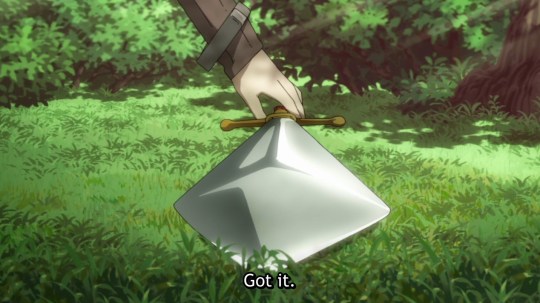
Because Raphtalia understands and approves of Naofumi’s goal, she promptly takes up her sword. Slavery and the disobedience curse failed to break her will.
Choice prevails over duress again during the fight in the mine. When Naofumi wants Raphtalia to fight the dog-beast, she is paralyzed by traumatic flashbacks to her parents’ deaths. Instead of just activating the curse, Naofumi employs persuasion, reminding her how they can fight the Waves of Catastrophe together and prevent other children from suffering her fate. This is a dramatic change—instead of just punishing his property until she obeys like he did earlier, Naofumi’s first move is to appeal to her with reason. This represents at least partial acknowledgement of Raphtalia’s personhood: one does not try to persuade an object, like the shield to which Naofumi previously compared slaves. When persuasion seems to fail, Naofumi briefly triggers the disobedience curse, but quickly rescinds it and gives Raphtalia the choice to fight or flee. In a battle of wills, the slave wins and the master gives in. Raphtalia proves stronger than both her fear and slave crest’s punishment, fighting for Naofumi only because she chooses to do so. (Raphtalia also has abandonment issues that play a part in her decision to fight, but even this is her own intrinsic motivation, something predating and independent of becoming a slave. She’s no infantilized simpleton who clings to a master because she’s helplessly dependent.)
Slavery takes a backseat to action scenes in the third episode. However, we discover that Raphtalia is a Pokemon and has evolved to her adult form after leveling up. Others see this, but somehow Naofumi doesn’t. In continuing to treat Raphtalia like a child, Naofumi provides a striking parallel to the paternalistic pretensions of real-life slaveholders. In addition to slavery’s dehumanizing and objectifying tendencies, each of which help masters justify themselves, slaveholders of the past have cast slaves as helpless and childlike. Pro-slavery logic argues that just as children need parents to discipline and care for them, so also slaves need masters. Naofumi’s inability (unwillingness?) to accept Raphtalia as a mature adult is solidly in line with how a real slaveholder might regard his slave. Even long after the United States abolished slavery, “boy” was still used pejoratively to demean African-American men.
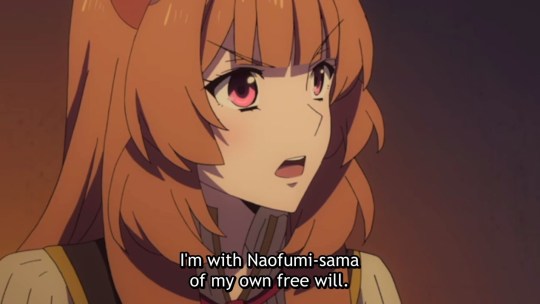
lavery takes center stage again in episode 4. With sickening irony, the people pretending to want to free Raphtalia ignore her words and proceed to bind and gag her—things Naofumi has never done! Naofumi’s treatment of Raphtalia is plainly flawed, but Raphtalia’s purported rescuers objectify her to a greater degree than he ever did. She isn’t a person to them, just a chess piece, a pawn in a game of moral superiority. Happily once Raphtalia is freed of both slavery and her restraints, she unleashes a glorious verbal beatdown on the antagonists.
While this scene ultimately affirms Raphtalia’s agency, it also offers perhaps the best basis (at least in the first five episodes) for accusing the show of favoring slavery: one could construe it as saying slavery isn’t so bad, that Raphtalia was happy being a slave, and that Naofumi’s kind deeds made slavery okay or even good. But that’s not at all Raphtalia’s point. She doesn’t defend slavery the institution—she defends Naofumi the person. She enumerates Naofumi’s kindnesses—shielding her, feeding her, treating her illness—and delivers an armor-piercing (spear-breaking?) question to Motoyasu:

When the Spear Hero stutters out a claim that he is, Raphtalia’s counter is brilliant: “If that were true, you would have a slave by your side, too!” She has just demonstrated that, at least in some respects, Naofumi is a better, more compassionate man than the Spear Hero. All through the confrontation, Raphtalia’s focus is on defending Naofumi’s good character, not on affirming slavery per se. If we consider the solidly negative way in which the show introduced slavery and rightly understand Raphtalia’s own words, we have no reason to conflate Raphtalia’s defense of Naofumi with a pro-slavery apologetic.
Morally, Raphtalia rises above Shield Hero and Spear Hero alike, and the scene in which Raphtalia defends Naofumi also explores his faults. Raphtalia emphasizes that his use of the disobedience curse was limited—but that means she still points out that he did indeed use it. Naofumi apologetically confesses to her that “I saw you as nothing but a tool at first.” After his previous blindness to her personhood and adulthood, Naofumi is forced to recognize that she’s neither an object nor a child. Naofumi also unfairly misjudges Raphtalia, immediately assuming that she’ll turn against him now that she’s free. But she proves him wrong and forces him to admit how he’s failed to respect her. She is faithful to Naofumi because she chooses to be.
Early in the fifth episode, Raphtalia gets a new slave crest, at her own request. Naofumi says it’s unnecessary, but Raphtalia calls it “a symbol of your faith in me.” Engagement or wedding rings spring to mind as examples from our world of symbols for relationships; I suspect there’s a bit of similarity to how Raphtalia views her crest. I wasn’t a fan of this turn of events, but I found it easier to swallow when I realized that, like it or not, it at least makes a lot of sense that Raphtalia would want this. The show previously established that she has attachment issues stemming from the loss of her parents, she spoke in episode 2 about her fear of being discarded, and part of what helped her overcome her fear of the dog-beast in the mine was the thought of losing Naofumi and being left alone. It’s quite logical for her character to still be dealing with this insecurity and obtain a new slave crest as a way of assuaging that anxiety. Getting a magical tattoo is hardly an ideal coping technique, but logically it fits with Raphtalia’s character.
As a Christian, I believe slavery is evil. Period. End of story. Case closed. However, The Rising of the Shield Hero reminds me that there’s a sad history of Christians—or at least people who identified as such—defending slavery. Antebellum Americans repeatedly twisted the Bible to justify slavery. Such writings bring together many of the issues—slavery, racism, self-righteousness—that we see in the show. (Warning: snark ahead; boojum status unknown.) In 1840, one Rev. Leander Kerr declared, “Abolitionism then is as foolish as it is wicked, lawless and reckless: and the time will come when it will be regarded as wicked and absurd as ‘witch burning’ is now.” Moreover, “Abolitionism is anti-scriptural and anti-Christian…there is nothing morally wrong in holding slaves.” Like many slavery apologists, Kerr appealed to the curse leveled by Noah upon Canaan son of Ham in Genesis 9.25-27. By some exegetical alchemy, this passage is transmuted into proof that God consigned blacks for all time to be the slaves of whites.
In “A Dialogue Between an Abolition Croaker, a Citizen of Boston, and the Prince of Darkness,” a Socratic dialogue from 1851, the character of the ordinary, Bible-believing, slavery-defending citizen trounces a strawman abolitionist, with intermittent contributions from the devil himself explaining how abolitionism’s satanic nature. At one point, the Prince of Darkness reveals his desire to promote interracial marriage and offers a remarkable interpretation of Genesis 24:
Abolitionists and freesoilers…are some of my best friends, and have been so for many years. They have rendered me very important service in several particular cases; such as trying to make null and void some of God’s decrees and ordinances concerning slavery… I lead those bewildered and blinded men into all manner of iniquity connected with the emancipation of the slaves, and also to amalgamation with them by marriage; but it was not so with Abraham; I could not so easily control him; for he would not allow his son Isaac to take a black wife from the Canaanites; but I have got some friends among you abolitionists, who approve of their own children intermarrying with the negroes, and thus becoming part and parcel of that unhappy and degraded people.
This exegesis, clearly the product of truly dizzying intellect, is rivaled by a later contribution from the citizen. He recounts the story of the Syro-Phoenician woman from Mt. 15 & Mk. 7 (she was black, he claims) and says Jesus refused to help her until she proved “her faith and humility” by “taking her place where she belonged, in accordance with the curse pronounced upon her progenitors.” In other words, the lesson is that Jesus refused to do a miracle for an uppity black woman until she stopped putting on airs.
I’ve seen memes joking about Renaissance paintings for depicting Jesus as a northern European, but hadn’t realized that real people who claimed to be followers of Jesus seriously argued that he was white. Sadly, one Rev. Josiah Priest, writing in 1852, disillusioned me:
The Saviour of mankind, though born of a Jewish copper colored woman, was nevertheless a white man. This complexion, which characterized the body of God incarnate, was such as pleased him, or he would not thus have appeared. The proof that he was a white man, is derived from a letter, written by a Roman Senator from Judea, in the time of Augustus Caesar, to Rome. In that letter, which is now extant, the man Jesus Christ is said to have been a man of surpassing beauty, having a bright fair complexion, with hair the color of a ripe filbert, which is inclining to the yellow or golden color. His eyes were of the hazel or blue cast; his forehead high, smooth, and broad… This being true, it adds another proof that, in the estimation of the Creator, the white complexion, such as is possessed by the race of Japheth, is more valuable than black or red.
Priest is emphatic that Rahab, one-time prostitute of Jericho who became an ancestress of Jesus, couldn’t possibly have been black like he believes Canaanites were, and must have been a Semitic woman who merely happened to be residing in Jericho. “It was abhorrent to God…that the immaculate blood of his Son, which was to be offered as an atonement, should be contaminated by that of negro extraction,” wrote this Titanic of theology. Priest also discovered that the Tower of Babel was constructed entirely by and on the initiative of black people, that the wicked queen Jezebel was black, and that “Had Onessimus been a white man, or an individual of the race of Abraham, St. Paul never would have arrested him as a slave, to return to his master.”
Priest’s efforts to “refute” scriptural arguments raised by opponents of slavery are likewise revealing. Since abolitionists appealed to passages like Rom. 13.8 and Gal. 5.14 and claimed that loving one’s neighbor was incompatible with enslaving him, Priest unleashed this marvelous counterassault:
God having judicially appointed that race to servitude, the law of love cannot abrogate it, any more than the law of love can abrogate several other particulars of judicial appointment. Such as, it is appointed unto men that they should die; the woman was condemned to be ruled over by her husband; the earth was cursed, in relation to its fruitfulness; the wicked dead are sent to hell; the earth is doomed to be burnt up; and many more things which might be adduced as being determined judicially; all of which the law of love cannot reach nor abrogate… God’s determinations and decrees are not frustrated by his benevolence.
Checkmate, abolitionist fools: God’s judgment triumphs over his love. Shush, don’t bring up James 2.13 (“Mercy triumphs over judgment”)! For the common abolitionist talking point regarding the horror of separating families by selling off members, Reverend Priest has a comeback that can only be described as literally diabolical:
On this subject, the abolitionists argue the same as they would were the case their own, imagining that negro parents feel such a circumstance as acutely, and as sentimentally as white families would under similar circumstances. But this is a mistake, as we believe, and does not apply to the negro’s case, as it would to that of the whites, on account of a want of the higher intellectual faculties of the mind of the blacks. On occasions of severe bereavement, the feelings of negro parents seem to be of shorter duration; as it is well known that the bond of marriage and family obligation with that race, is of but secondary considerations, or of slight influence, as a knowledge of, and a participation in, high intellectual love and elevated affections, is not reached by the black man’s soul…when separated from each other by being sold, it is not so grievous a thing as it would be to the mind and feelings of a white man or woman.
Your eyes do not deceive you: this demonic excuse for a “Christian” minister really did argue that breaking up slave families was fine because black people didn’t really love their spouses or kids all that much. Priest has another objection to looking at the treatment of blacks in terms of how white people would want to be treated: the “doom of the negro race” established by the cursing of Canaan in Gen. 9 “raises a barrier which is impassible and insurmountable to all earthly power,” such that “Even the famous words of our Lord called the Golden Rule, cannot apply here.” In other words, why bother with empathy when they’re just demi-humans?
An 1861 pamphlet titled “The Governing Race; or, Is Slavery Sanctioned by the Bible?” explained that Jesus’ mention of slavery in his parables demonstrates his endorsement of it as righteous. I suppose that if Jesus’ use of servitude imagery in his teaching proves he endorsed slavery, then the parable of the unrighteous steward means Jesus endorsed embezzling from one’s employer, right? Also, the true meaning of “Love your neighbor as yourself” and the parable of the good Samaritan Jesus told to explain the command is we should aid the needy, but without “the relinquishment of our just rights, or the giving up what belongs to us.” (Forget about the fact that Jesus emptied himself and gave up incomprehensible privilege and glory in order to serve us, as Paul said in Phil. 2.5-8.) In fact, the good Samaritan “had the right to expect that the wounded man would exert himself to the utmost not to be chargeable to his benefactor. That was the neighborly duty of the man who had been helped.” What a blessing to receive such illumination and find out that Jesus was teaching that I only need love others insofar as it doesn’t cost me anything! Motoyasu jumps to mind—happy to “help” a slave if all it requires is bullying a guy he despises anyway, but who did nothing substantive to better the lot of even one slave.
As far as I can tell, this is a representative sample of the moronic, vile, perverted nature of biblical justifications for slavery. I focused above chiefly on scriptures interpreted to validate slavery, but that risks overlooking one other major argument these authors (and others like them) used. It boils down to variations of “The Bible never says it’s wrong.” I still hear this one today, unfortunately. According to this line of thinking, since the Law of Moses permitted slavery and Jesus and his apostles never explicitly condemned it, I would be wrong to insist slavery is inherently sinful. Amusingly, this logic validates quite a few practices that I don’t know any Christians would support—after all, the Law permitted and Jesus / his apostles never explicitly condemned polygamy. Unfortunately for this line of reasoning, Jesus plainly says the Law sometimes permitted things that went against God’s true will (cf. divorce in Mt. 19 / Mk. 10), so a practice being regulated by Moses doesn’t automatically mean God approved it. Moreover, Christians totally do believe some things are wrong—based on the Bible!—despite those things not explicitly being called sins. I’ve never heard of a Christian who argued on that since no scripture calls abortion a sin, we cannot condemn it.
The “God didn’t say it’s a sin” argument for slavery reminds me of how people used to talk about communism. Once upon a time, you’d hear people say that communism was a really wonderful system in theory, and that although it had caused immense misery everywhere it was tried, that was just a matter of bungled or unfaithful implementation of the theory. Communism’s redoubtable string of genocidal failures was not evidence that there was anything wrong with communism itself. Let’s concede for the sake of argument that communism is good in theory. But if we have abundant evidence to conclude inductively that humans invariably mess up this (hypothetically) good system, then should we really keep trying it, thinking that this time will be different? That this time, we’ll get it right and it’ll be great? We could make a similar point about moral perfection: it’s hypothetically possible for a human to live without ever sinning. But how “possible” is it really, in practical terms? Well, “If we say we have no sin, we deceive ourselves, and the truth is not in us” (1 Jn. 1.8). Out of all the countless humans who have ever lived, only one can boast of a sinless life: the Lord Jesus. Knowing this, it makes no sense to approach life expecting moral perfection from ourselves or others (though we can and should strive for it).
Much could be said (and has been said) analyzing various scriptures and exploring their implications for slavery. But set aside for a moment whether slavery is *inherently* sinful: can you find me even one example anywhere in human history, out of the countless times and places in which slavery existed, where a society practiced slavery in a consistently just, moral fashion? An instance where the institution of slavery was not implemented in a blatantly sinful way? No, you can’t. It’s never happened, and it never will. Slavery has always served, and will always serve, as a means of exploitation. Slavery has never failed to be a way for the powerful to indulge their greed, selfishness, and pride. Slavery has been tried, and it always proves to be dehumanizing and objectifying. I freely concede that Jesus could do slavery in a morally pure, righteous way, but based on history, I wouldn’t trust anyone else to be capable of that feat. I don’t care whether that’s a problem metaphysically inherent in the institution of slavery or merely the result of humans unfailingly abusing absolute power over other humans. Either way, I contend that human history proves that slavery is inseparably bound up in a host of sins, and thus it’s perfectly valid to declare slavery immoral. Be honest: how confident are you that you, personally, could fulfill Jesus’ teaching (e.g., “Love your neighbor as yourself,” “Whatever you wish that others would do to you, do also to them”) toward a human regarded by yourself, the law, and society, as your personal property? Slavery has been done sinfully literally every time mankind has ever tried it: are you morally superior to countless slaveholders of the past?
All this is worth considering in the context of The Rising of the Shield Hero because it’s so tempting for us to be Motoyasu—to set ourselves up on the moral high ground looking down with smug superiority at that other guy who’s doing something so obviously wrong. In the show, Motoyasu thinks himself a paragon of righteousness, a far better man than Naofumi. Ironically, if any person is a tool in the story, it’s not Raphtalia the slave but Motoyasu, the useful idiot in the evil schemes of the king and princess. Once upon a time, people who were trying (at least nominally) to serve Jesus twisted the Bible in outrageous ways in order to support great evil. What of us? It’s easy to huff and puff about the evils of slavery today, but are we, like the Spear Hero, blindly aiding some other form of evil? Hopefully not, but we certainly possess the potential to do so.

The Bible and Raphtalia alike make an important distinction between hearts and appearances. “Do not judge according to appearance, but judge with righteous judgment,” Jesus taught us (Jn. 7.24). Throughout the Bible, we see God calls upon us to judge evil actions, but he also affirms that only he can judge a person’s heart. In the case of slavery, for example, while I am confident that objectifying another human as property sinful, I can’t speak with that same certainty about the heart or eternal salvation of any particular slaveholder. I can condemn the action (slaveholding) while accepting limits on my ability to judge hearts. Raphtalia gets this. Others in the show judge Naofumi based on outward appearances, but Raphtalia’s opinion is based on what she’s seen of Naofumi’s heart. She sees, for example, that although Naofumi owns a slave, he doesn’t partake of the arrogance and racism on which the kingdom’s slavery is based. Naofumi has misjudged others (e.g., Meanie, err, Myne) and been gravely misjudged by others, but despite his own failings and the fact that others treat him wrongly, Raphtalia is there to loyally support him. I imagine we all can relate to Naofumi’s struggles—we’ve all made regrettable errors of judgment regarding other people or what’s right, and we’ve been unfairly judged by others. Thankfully, through all our trials we can count on the God who, though faintly reflected by Raphtalia’s character, knows us better and is more faithful to us than even the greatest of cartoon raccoon-girls.
#anime#christianity#tate no yuusha no nariagari#the rising of the shield hero#slavery#naofumi iwatani#raphtalia#articles#Author: Jeskai Angel
6 notes
·
View notes
Text
Rock and Compass Watches Once Upon A Time – 6.19: The Black Fairy

Overview
Many, many years ago, Malcolm and Fiona welcome a baby boy, but their happiness is disturbed by a fairy prophecy that says that he is destined to be a saviour who will die in service to his fated duty. This sets about a chain of events with far-reaching consequences. In Storybrooke, Rumple is determined to get his son’s heart back but in the process, he discovers the truth about why his mother gave him up.
Discussion and Thoughts and things of significance
This is an episode that improves on re-watch after the shock of Rumple’s short-held fated role of Saviour has been absorbed. It’s dense on detail and provides a fascinating chapter of Rumple’s backstory. What makes the story extra interesting is the parallels it offers and the very real possibility that this is foreshadowing future events. (I must mention that my enthusiasm for writing about the show is a little thin since the announcement that Jennifer Morrison is not returning. It doesn’t feel fun to speculate anymore. With the strange set-up for the shows continuation all the threads that I’ve been pulling at for the last six years are going to come to nothing and that makes me sad. I’ll finish out this season and try to be business as usual.)
Discussion and things that might be of significance:
Like Mother, Like Son – There are a lot of similarities between Rumple and Fiona. They both take on magical powers to “save” their child. He became the Dark One to stop Balefire from having to fight in the Ogre War and she becomes a Fairy, to try to find a solution to her son’s pre-prescribed life-path. They both become evil in the pursuit of that goal – Fiona is willing to (presumably) kill the child with the crescent mark and she goes so far as to create the dark curse spell that would send all the potentially threatening children to the Land Without Magic. Rumple kills, schemes and manipulates once he gets the magic that gives him power and status. Neither of them is willing to give up the power for the good of the child they are trying to save. Both of them are good examples of self-fulfilling prophecy - their choices, in trying to circumvent something actually lead to the thing they feared coming to pass. Rumple’s actions after he hears the Seer’s prophecy and Fiona’s choices after hearing the fairy’s both lead directly influence the machinations of their prophecies . Fiona literally becomes the thing that will kill her son, and Rumple’s actions lead to his son becoming fatherless. They are a great lesson that trying to change the future doesn’t work. This is demonstrated literally when Henry tries to write a set ending in the book and it is erased, and is contrasted completely by Emma being willing to meet whatever her fate has in store for her. I also love the revelation that Malcolm blamed the baby for his wife’s loss. This is a fantastic explanation of why he was so neglectful, why he was searching for a place like Neverland.
Like Mother, Like Wife – It was interesting that Fiona’s power comes from books – it is book-knowledge that allows her to become a fairy. Her fairy colour is yellow, and she gets about in a yellow ball-gown… the parallels to Belle are not a coincidence.
Foreshadowing? – The flashback is interesting in its own right for sure, but on re-watching I was struck by some other possibilities, particularly during the scene in the fairy vault. The story here involves two mothers – one biological, one “adoptive” in the form of a fairy godmother – both women are invested in the child’s future. In the potential parallel I’m seeing, the roles have been switched – Tiger-Lily wears red and is representative of Emma, Fiona, throughout the episode, is seen wearing a beige wrap over her yellow gown, a beige very similar to the coat that Regina has been sporting lately. Yellow turns into Black with the pursuit of the curse; this along with all the other similarities between the two hammers home their paralleled characters. Tiger-Lily knows that Fiona is potentially dangerous, but works with her rather than against her for the good of the baby. Sound familiar? So now I’m wondering if Henry’s Author problem is not going to prove to be more serious than we presently know and that when this becomes apparent, Emma and Regina are going to disagree on the course of action, leading Regina to do something drastic, and probably questionable, to try to avoid his fate. Which could indeed be the setup for our bizarro world season seven. I wonder though, will it end up with Henry banished, at least temporarily… Or Regina, and Rumple and Hook banished elsewhere.
The problem with saviours – they are apparently not as helpful as advertised, according to Rumple. But really, when has Emma not been helpful to him? She broke the curse as planned, she helped him find his missing son, she helped him out when his blackened heart would have killed him, she’s tidied up after so many of his schemes and he wouldn’t have his freaking powers back if it wasn’t for Emma making the hard decisions as the saviour! Or is he meaning that time that he wanted to kill her and get her power but she didn’t cooperate? Is that her being unhelpful? The real zinger though comes from Emma when she says the same could apply to him. Only in her example, it’s accurate.
A mother’s breath – Rumple is terrified of losing another son. Belle says he won’t, “not as long as his mother is drawing breath”. It’s an interesting line. She doesn’t say “as long as I’m drawing breath” so it invites one to consider multiple meanings. Is it foreshadowing Belle’s demise and the eventual loss of another son? Is Gideon too bound up with Black, the woman he calls mother, meaning that her death will lead to Gideon’s downfall?
A family’s fate - there is certainly a pattern of children and parents being separated in Rumple’s family tree – it happens to every generation. Is it fate or choice? Maybe this family just needs to start making some better choices…
A Snow Job – Black and Gideon masquerade as Snow and David. It just seems like a timely reminder that this is a thing that the magic-types can do. Although it was weird that Black and Gideon revealed themselves rather than just stay in character and whisk blue away, confusing everyone in the process. That would have been funny. But alas, these villain’s do love to explain themselves.
A Snow Job II – Gideon gets cuffed and so is unable to use magic to get away. Belle tries to reach him, but he tells her that The Black Fairy has ordered him to feel great pain if he tries to resist her commands again. He gives a demonstration and Belle stops the interrogation. I’m not sure I’m buying it. Then, when they use the sands of Morpheus (Gideon’s particular speciality) to try to locate his heart, they end up in Rumple’s dream and Rumple is the one who ends up learning information that makes him more open to listening to his mother’s side of the story. Everything seems to go in Black’s favour – even the secret she didn’t want him to know (that she cut his fate to be a saviour) ends up working for her. And I’m still not very trusting of Gideon – how much loyalty does he have to his adopted mother? Because honestly, that family reunion didn’t feel very warm.
What’s good for the goose – Rumple does what’s good for Rumple. It doesn’t ask or discuss or think of others. He puts his need ahead of all. If you’re in his select circle he can seem very giving at times, but it often comes at the expense of others. Rather than ask Emma to delay killing the Black Fairy so he can get Gideon’s heart back, he forces her to join him on the dream walk by inflicting the dust on her without permission. Even if he is playing a deep game with the Black Fairy, it will still be at the expense of everyone except Belle and Gideon. This guy is no Hero even if his last minute actions do save the day in the finale.
Do you trust me? – Rumple asks Belle the question, and her answer is telling. Well, the big pause before she gives him a diplomatic reply is – she trusts that he’ll do what’s right for their son. Does she personally trust him? No, clearly not. But she trusts in Rumple doing what’s good for Rumple, and in this case, the salvation of Gideon is what’s good for Rumple. Sometimes it seems like Belle has forgotten that Rumple and his actions were what led her to give temporary custody of baby Gideon to Blue in the first place. She seems to have forgotten all about his dalliance with Evil Regina, but at least the lack of trust is a sign that she’s not quite as “forgiving” and spineless as she seems. I think that working with Rumple to get their son back is much more about Gideon than it is Rumple.
A different kind of stick – Regina teaches Zelena to drive. And whoa, what a car! This would seem to be a nice sisterly bonding thing, but it’s really about ulterior motive. Regina wants Zelena to take Henry away from Storybrooke once the final battle starts and if doesn’t go so well. In short if Regina dies, she wants Zelena to take him out of Storybrooke to live in New York where they can start a new life. Problem here – Henry’s not going to let that happen for one, and two, this proposal doesn’t; seem to have been discussed with Emma. I get that she wants to save Henry’s life, but her process is questionable – more ammunition for my earlier speculation perhaps? And what are they expecting this “last battle” to be anyway? A fight to the death with swords? A magic duel at dawn? The whole town bearing arms on Main Street?
The heart of Storybrooke – it’s the jukebox. With songs. Music is the heart of Storybrooke. I see you upcoming musical episode. And is there something else in the cavity under the jukebox? It kinda looks like there is… it’s silver and shiny. It might be a trick of the light but It doesn’t seem to match the shadows. A wand perhaps…
Who are you – I like that Hook was so quick to vocalise suspicion that Regina was not Regina in the Diner. It wasn’t suspicion of Regina per se, but it was a welcome awareness that they need to be more cautious. Regina’s annoyance was funny – I’m not sure why she would be offended at the suggestion that she was not herself, a guilty conscious perhaps? If only. I would love to see the Charming family develop their own code words. Another missed opportunity.
My Town, My Rules – there it is again, that insistence that one particular individual owns the entire town. Regina thinks she owns it because she created it with the original curse. When the show continues with the skeleton cast, I would love to see Regina removed from this town to a place where she is not even a usurper queen – where she would have to face herself with honesty and without status, wealth or power. I’m guessing the Black Fairy has designs on “owning” Storybrooke too. The Regina vs Black fairy showdown played as superfluous to the episode – Not only do we know that conventional magic is useless against Black, as demonstrated by Zelena last week, it also comes across as hypocritical because she does everything that she cautioned Zelena against. But then, Regina and hypocrisy have always been close buddies. The scene seemed to be trying to make Regina seem more of a big deal than she presently is but it actually only reinforced her irrelevance in this entire “last battle” storyline. She has never felt more shoehorned in. And apart from Zelena hitting Black with her car, it was an unnecessary waste of two minutes that might have been spent more effectively elsewhere. Is it just me or was Regina’s eagerness to “kill a fairy” a little chilling, her facial expression was pure evil. Her taunt that the Black Fairy was not brave enough to cast the curse was positively alarming! Does she really equate killing the thing you love the most and cursing a kingdom full of people with courage and valour?
The Colour of Magic – The Black Fairy’s magic didn’t seem dark at all ? And Rumple’s magic, when freeing Gideon from his bonds is red, much redder than the dirty red it usually is.
Over-identification much – Emma and Rumple go on the dream walk they inadvertently start to peel back some of the layers of his young life and, in the face of his reluctance, Emma encourages Rumple to seek the truth and councils him as to the scary nature of finding out why you were abandoned. She presumes anxiety and fear and assures him that this is the scariest thing he will ever face. Emma’s abandonment discourse is strong – she might be part of a family now but her experience has had a huge impact on her – we know it has – and it’s still something she carries with her. It is why she reacted the way she did when Hook went missing, it’s why she held her parents at arms length for so long. When Emma hears that Rumple is also a saviour, she is ready to believe, perhaps over-identifying with his childhood abandonment and the burden of being the saviour. Rumple warns her not to presume his experience is the same as his, but I don’t think she listens – this is why she’s so ready to hand the wand over, and let him assume the mantle of Saviour. My God Emma Swan is a generous soul! How freely she shares her title with such a dishonourable man who has caused so much damage! It’s the same strategy she used on Regina – encourage the good and ignore the bad. It doesn’t always work.
Wand reformed – the reformed wand is handed over to Rumple. It still makes me incredibly uncomfortable to see that wand in anyone other than Emma (or Hook's) hand, even more so after the flashback - Tiger-Lily sent it back for Emma; Emma saw the memory and finds out that Rumple is a saviour sure, but she still meant the wand for Emma, not Rumple. Of course, she didn’t see Rumple’s fate get cut but still, the wand was sent back as a weapon against the Black Fairy and the wand was sent to Emma – she should have kept hold of it. And why does Regina take credit for finding the wand when she very clearly didn’t.
Belle of forgiveness – Belle is chuffed to hear that Rumple “is” a saviour. She takes it as proof that he has been a good man all along – the man behind the beast. Too bad his actions and choices have not backed that up. The title “saviour” doesn’t make up for all the dark and evil deeds he’s undertaken, it just shows that he’s failed to live up to his potential to be a decent person. And Belle is remarkably forgiving – she seems to have forgotten all the things he did that led her to surrender baby Gideon, not to mention his affair with Evil Regina. Belle seems to have misplaced her backbone again. One wonders how she will cope with his duplicity when it is revealed.
Everything I do – Rumple assures Belle and Gideon that, even when it might not seem like it, everything he does is for them. It sounds noble, like he is pre-warning them that he is playing a deep game to protect them . . . but he also seems to be willing to sacrifice everyone else to achieve his goal and that ain’t noble at all. And here we go off the same old well-worn track they’ve all walked before. Cos he’s about to do the wrong thing for a ‘noble’ goal, just as his mother did, just as he has done before. Do they never learn any lessons? And can I just say I have a bit of difficulty with a grown man and a grown woman needing this kind of intervention and protection. Surely they are entitled to the truth of the situation and allowed to have some choice in how the family proceeds.
Banishment - I’ve also got to say, the Black fairy’s punishment for creating the curse and being a renegade is very odd. Tinkerbelle was stripped of her wings and power for attempting to help someone and for stealing a bit of pixie dust. Black gets banished, wings intact, to a realm that she is able to become overlord of AND be free to mine dark fairy dust – the most powerful and dangerous of all the magical ingredients – complete with slave labour. Some punishment.
Operation Best Man – so sweet that Killian asks Henry to be his best man. I like that Hook has always viewed Emma and Henry as a package deal. “Your mother will most certainly kill you” is a very interesting line though – Hook says it in relation to missing rings but … I don’t want to say it . . . but I’m going to say it - that line sounds OMINOUS. Henry even says that word at the beginning of Hook’s speech. And there is an air of ambiguity about it with the generic “mother” used rather than a more personal, “Emma” or “your mum”. Is Henry in peril being foreshadowed here?
Very Superstitious - Hook is not staying at home tonight – it’s bad luck to see the bride before the wedding and he’s a superstitious seafaring man. “The last thing you and I need is another stitch of bad luck. “After tomorrow, there’ll be no getting rid of me.” Oh great, you big buffoon – now you’ve done it – of course you’re going to get separated again! And for the whole of this freaking unnecessary season seven too. But apart from that their happiness is just gorgeous! Make hay while the sun shines.
WTF – so even though she’s got her son back in her corner, Black is determined to confront Emma because . . . and that is the sixty-four thousand dollar question. Because she is the saviour? Because light and dark are ‘fated’ to fight the final battle? It all seems very thin and petty. This woman doesn’t know Emma Swan in the slightest, there is no vendetta or hate - there is nothing personal driving her malice. she just came out of nowhere determined to fight or kill Emma and hasn’t ever really made it clear why. And everyone just seems to go with it because the words “last battle” bandied about. It all just seems so misplaced and overblown. She is no worse than any other villain that's paid a visit to town and not even anywhere in the same league as Rumple or Regina! She is simply not worthy of being Emma’s end-game nemesis.
#meta and discussion#ouat spoilers#ouat speculation#ouat discussion#ouat season 6#the black fairy#episode analysis#anti-rumple
33 notes
·
View notes
Text
Yet another episode of The 100 where things go swimmingly, 100% according to plan, with no hiccups and DEFINITELY no wars being declared.

C’MON. Of course things went sideways. Actually, saying things went sideways is an understatement. Things went sideways, fell off a cliff, hit every sharp outcropping on the way down, exploded at the bottom of the cliff, then released a lake of liquid fire that engulfed half the earth.
So, business as usual.
Looking around the review sites yields a consensus opinion that season 5 is on fire, giving us perhaps the best first four episodes of any season. If anything, things seem more crystallized this season, more in-focus than ever before. That six year time jump has re-invigorated a show whose moral lessons started to grow a bit rote. With this episode, the table is set for the rest of the season: we at war, kids. Yaaaaaaaaaaaaayyyy…………..?
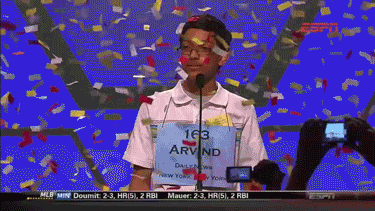
Written by Charmaine DeGraté and directed by Dean White, “Pandora’s Box” has loosed all sorts of anarchy upon the world and the fallout is going to be delicious. This episode probably overtakes “Fallen” as my favorite of DeGraté’s work. Like last week, this episode is PACKED with a lot of information and character moments, but unlike last week, it lit the fuse for a showdown between a bunch of prisoners and a death cult.
Strap in, folks. Season 5 is LIT. Let’s get into it.
You’re In a Cult, Call Your Dad. No, Seriously, Call Your Dad!
“Red Queen” showed us a little bit of what became of life in the bunker, but this episode pretty much reveals the ugly crazy in all it’s … uh … glory? The chanting, the single-mindedness, the blind devotion to a leader…it’s a freakin’ cult.
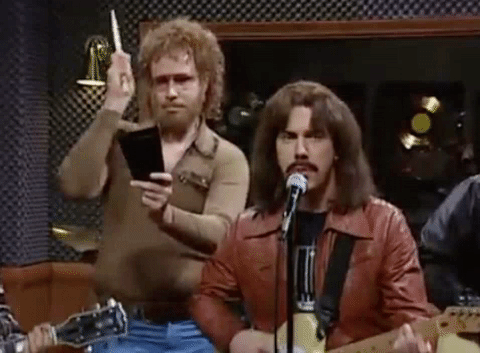
This is a joke within a joke. JOKECEPTION.
Octavia. Girl. What in the FUCK have you created?
We knew things had gone to shit in the bunker, but this is a full on brand of cray-cray that most people, at first blush, seem to have completely bought into. Octavia is almost unrecognizable from the girl we saw in season 1 and she’s frightening as fuck. But who frightens me more?
Gaia. SHE SCARES ME Y’ALL.
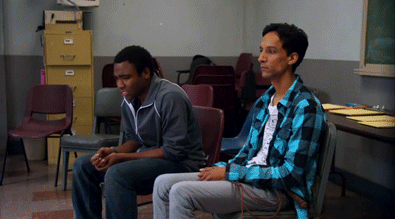
You guys…I want to like her, but I don’t trust her. She’s a religious zealot who has transferred her faith in the Flame onto Blodreina. While Octavia is the “leader,” Gaia is the one moving the gears, enforcing Wonkru’s laws, and ensuring that Wonkru is as dedicated to Octavia as Gaia is…or at least the IDEA of Octavia. At this point, I think anyone could be Blodreina as long as Gaia is there to protect the position of what is essentially the Commander for a new, very dark age. After all, the Flame went in and out of a long line of Commanders, all of which seemed interchangeable, with only Becca and Lexa as notable exceptions.
People filling that seat come and go…the person isn’t important, the position is. I honestly think if Octavia were to fall, Gaia would just find another Red Queen or King to take over as figurehead, as long as Gaia herself was always by his/her side. Octavia dies? Oh well, Wonkru finds a new Blodreina, the cult goes on. I’m tellin’ y’all, Gaia shady.
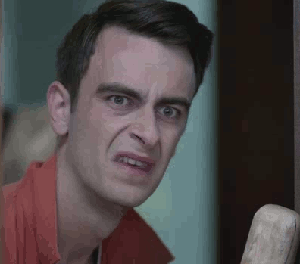
I find it ironic that a place built by one cult is now home to another. In my season 5 predictions, I thought we’d learn more about Second Dawn and Cadogan. And while we still might, Wonkru certainly gives them a run for their money, and seem far more deadly and dedicated to Blodreina.
What we have yet to see are the cracks in the Wonkru armor, save for Indra, who seems to be loyal to Octavia to a point. Indra always looks like she’s unhappy with someone or something, but I truly believe she’s not a big proponent of the fighting pit, but things have gone too far for her to speak up now. Only through her actions of trying to protect Kane do we see a small act of rebellion on her part. Her story and how she interacts with both Gaia and Octavia will be very interesting this season. I don’t think she’s above betraying Octavia, but it will take A LOT to get her there.
Take note of the bunker’s lighting. Much of it has a red tinge to it…a nice stylistic choice to further reinforce the idea of the Red Queen. It’s also, obviously, the color of blood. The bunker is completely in Octavia’s control. Everyone looks to her to for permission. Now that Wonkru is out of this confined space, will they continue to look to her for all their orders, do they trust she can continue to protect them, or will she – or Wonkru – start cracking under pressure now that they’ve escaped their petri dish of horror?
And what if Octavia thinks she has to be even more brutal in the face of an enemy? Guys…we in for some shit.
GODDAMN, Kane and Abby Need a Hot Shower, Some Soup, and a Nap
Y’all, Kane and Abby look rode hard and put up wet. Both look to be mentally and emotionally spent. The past six years have not been kind.
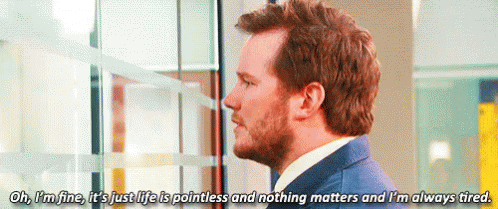
It’s clear Kane and Abby have had a hard road in the bunker. Kane looks worn down to the bone, and Abby doesn’t look much better, addicted to pills for what looks like the past six years.
When Kane makes his last appeal to Octavia, I think it’s waaaaaaaaaay too late to propose that they try to do better. That ship has sailed. Even Kane acknowledges that Octavia has made Wonkru strong, got them through whatever the “dark year” was. And that’s his mistake…allowing things to go on too long without speaking up, without appealing to Octavia’s better angels before she totally became Blodreina. Because truth be told, there’s little of Octavia left. She’s now this new entity that she thought she needed to be to keep the bunker as clear of chaos as possible. Keeping the chaos contained to the fighting pit. In the process, Octavia has become hardened in a way that yields only to a black/white view of the world: Wonkru or enemy of Wonkru. It’s a mantra that she repeats six years later. While that type of solidarity might have served to get control of the bunker, maintaining control has taken something else entirely. 400 people dead…what exactly happened in those six years? And that dark year? WTF is that???!!!
Kane has always tried to fight for a better world since he saw the error of his ways in season 2, but here he’s just defeated. He pleads with Octavia, but it’s such a last ditch effort, an argument made too many times to carry much weight anymore. Especially with someone as far down a dark path as Octavia. I understand the feeling. I live in the US during a sham presidency full of lies and corruption. No matter what you do, think, or feel, things just seem out of control and the world is upside down.
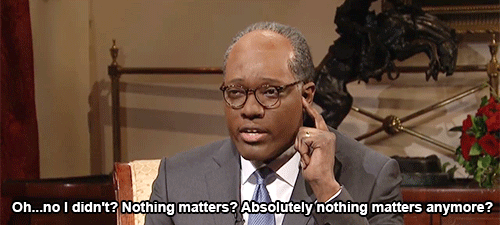
Abby’s addiction is going to be a tough story line to maneuver her through. We still don’t quite know why Abby needs the drugs she’s on, and we don’t know what kind of drugs they are. I think we have to assume she’s suffering from the same side effects of jacking out of ALIE that Raven was. And seeing as she’s seemingly referred to as the only doctor (hello? what about Jackson?), the pressure to be that for 800+ people while your brain is frizting out is probably overwhelming. She strugs to func something fierce.
Kane and Abby repeat some lines we’ve heard in the past, that they’ve done terrible things to survive, but it’s so half-hearted on her part that it’s just rote now. Kane knows this and says it’s just something they tell themselves to justify the horrors they’ve inflicted on others and each other. There’s no more fight left in these two. Even when Kane is going to knowingly sacrifice himself, it’s not out of some noble desire to be better or rise above the chaos…I genuinely think he’s completely spent. There’s no more energy left to appeal to anyone’s better selves or to try and fight for a better world or better versions of themselves…it’s all too much.
I would usually joke about Beardy Sexy Kane and full-size body pillows of said individual, but watching him…watching everything in the bunker…is just painful. I didn’t like watching the bunker scenes at all because they were filled with so much culty cray cray and hurt thrust upon Kabby that it made me uncomfortable. Good…I should not watch Wonkru’s death pit and feel good about it. I should feel creepy crawlies about what’s transpired down there.
Speaking of creepy crawlies…
WHAT. THE. FUCK. HAPPENED. IN. THE. DARK. YEAR. QUESTION. MARK. EXCLAMATION. POINT.
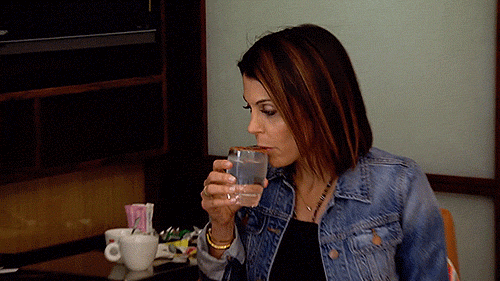
Reunions, Reunions Everywhere! Come Get Your Hot, Fresh Reunions!
Goddamn, this episode wasn’t pulling any emotional punches and thank god it didn’t. We finally see Clarke and Bellamy back together after six years. Bellamy was certain he’d never see Clarke again because she was presumed dead, and Clarke had to have been worried that something went wrong on the Ark after they didn’t return to earth after five years. So it’s no wonder that these two clasp ahold of each other as if they can’t believe the other is corporeal.
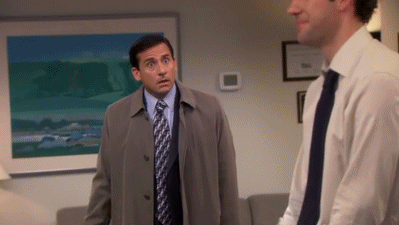
While I love this reunion, the one that really got me in the feels was Clarke and Raven. Not even in the same room together, I got hit straight in the heart stings by Raven’s reaction. The look on her face, and thanking Clarke for saving them…Princess Mechanic has been a dynamic I’ve loved over the years, even when I’ve felt this friendship has been underserved a bit in previous seasons. I hope we get more of Raven and Clarke and Clarke and Murphy, who uttered the line I head cannoned almost immediately after the season 4 finale. OF COURSE there was going to be a “and they say I’M the cockroach” joke. I love it.
I always long for more interaction between Clarke and Murphy and Clarke and Raven. I know not all of these relationships can get screen time, but there’s still a lot of emotional depths to plumb, especially after six years of evolution and change. Tearing characters apart and putting them through the ringer then bringing them back together again affords the opportunity to explore new aspects of character interactions, and I hope we just get more of those great character moments.
Speaking of reunions…
Welcome to My Death Bunker Horror Show Beautiful Home!
Bellamy makes a deal with Diyoza to use their mining equipment to open up the bunker. The first person to rappel down is, of course, big brother Bellamy, who is greeted by his sister, who is so totally not a murderous cult leader now.
We get to see Octavia reemerge for all of two seconds as she embraces Bellamy. Blink and you’ll miss her. That might be the last we see of Octavia because she’s Blodreina now…even Miller, her OG friend from the dropship, calls her by this title. It’s JARRING. These old friends from the bunker are a welcome sight, but also a bit off. It’s like re-connecting with old friends on Facebook and they eventually want to get together with you to talk about a great work-from-home opportunity. They look the same, but they’re Stepfordy now and it’s awkward.
I’m tellin’ y’all…if Miller starts evangelizing about a skin care line, BEWARE.
When Clarke rappels down moments after Bellamy, she’s much quicker on the uptake when she realizes she’s literally in a pit covered in blood and weapons, with spectators on all sides.
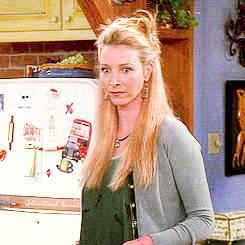
It’s only after Octavia goes to awkwardly greet Clarke…
…that Bellamy starts taking a look around and begins to understand what’s been going on in the rotunda for six years.

Something’s definitely fucked up about this place.
Diyoza and McCreary both come down as well and while Diyoza seems unfazed, I get the feeling that McCreary might be a little into what Octavia has done with the place.
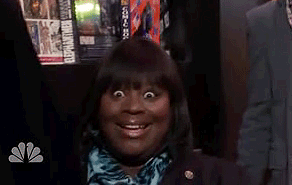
I really enjoyed all the reunions that we got after opening up the bunker, especially between Bellamy and Octavia and Clarke and Octavia. Clarke and Abby left me feeling a bit cold because Abby isn’t really Abby…she’s a junkie right now and I wonder how much the drugs are affecting her decisions. Especially the decision to go with the Eligius crew at the end of the episode. Yes, it was a chance to save Kane, but why was she so willing to part from Clarke that quickly?
The somewhat lukewarm reunion between Clarke and Octavia is very interesting to me. No, I didn’t expect warm hugs all around, given the history between these two (remember, Clarke’s last notable action towards Octavia was stealing the bunker out from under her). There is so much tension and unspoken conflict in this relationship that I hope gets to play out this season. These two have never really had it out and Madi might be the chess piece that Octavia uses to further her own agenda (whatever that may be outside of war) while screwing over Clarke. I am here for this conflict and for them finally having it out. Throw down, ladies!
So let’s talk a little about the episode’s title, “Pandora’s Box.” It’s obvious that cracking open the bunker is a metaphor for opening up Pandora’s Box. The story is that once opened, a whole bunch of bad stuff escapes into the world – death, sickness, evil. Pandora hastily closes the box once she realizes what’s being unleashed onto the world, only to prevent the last thing from escaping – hope.
It’s kinda interesting to note that the box was originally a jar, turned into a box through a mistranslation. The Eligius crew break into the bunker in the high ceiling directly above the fighting pit. The pit itself is at the bottom of a large, round room. Sorta shaped like a jar, if one had to describe it in such terms.
What I find interesting is that the bunker is the symbol of Pandora’s Box, meaning that all the bad shit loosed upon the world is coming from this bunker. From Wonkru. From Octavia. That’s quite the statement to make regarding what the Bunker people have become, because it’s not like the Eligius crew is a bunch of choirboys and girls. If Wonkru is the evil coming from Pandora’s Box…what does the Eligius crew represent? A sleeping giant is vaguely threatening. You don’t want to wake a sleeping giant…but this group seems to have a lot less glue holding it together than Wonkru, and we’ve seen some rumblings of a coup. Diyoza has a huge goat rodeo to try and control. Good luck, girl!
Another bit of an aside, I really love the use of light and darkness when Bellamy descends into the bunker. He’s bathed in light and cannot see into the darkness, where Octavia and everyone else is just out of sight…I don’t think this is a mere visual trick. It’s symbolic. When Octavia is pulled up, she rises up in the light, towards freedom, towards the heavens. It’s almost Christ-like. Which again, I don’t think is simply a cool visual. Consider her S5 poster:
When I saw it, I immediately thought “goddamn if that isn’t a post-resurrection Christ pose.” Bathed in light, palms out to display his Crucifixion wounds…it’s a very familiar visual from my Catholic school days.
Now am I saying that Octavia is Christ? Hell no…but displaying her as a religious figure makes sense, especially given how devoted her people are to her. She’s the object of a belief system that resembles religion, especially if Gaia had a hand in its formation. And like any dogmatic system, it could prove to be dangerous in the hands of zealots and fanatics. She is also, in a sense, resurrected as she emerges from the bunker…or her tomb, if you will. All of Wonkru is freed from their underground crypt…from the ashes they did indeed rise.
Octavia presented as a mythological figure fits her character arc, especially considering her past. Octavia was brought up on a steady diet of mythology literature…she knows the power of larger than life figures and of choices that can bring down gods.
Stupid Sexy Dangerous Eligius
I liked the Eligius crew last week. I like the Eligius crew this week. And though they got double-crossy and murdery and I STILL LIKE THEM.
I’m a garbage person, I accept this, but I know you, dear reader, love them too. Join me in my abode.

BYOB.
Okay y’all, we had several mysteries last week from this group, but now we find out they need a doctor to find a cure for something…cure for what? Is it something to do with cryosleep? Did they find something out in space that they need to deal with? Where is home? I’m assuming Diyoza is talking about the valley they’ve claimed as their own, but it’s still on odd term to use for some place they’ve been for all of a hot minute.
And what’s the deal with Diyoza and McCreary? I kinda get a vibe that they might have hooked up. Is it just me?
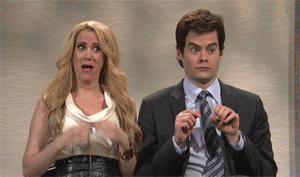
I know…how heteronormative of me.
There are times when he’s almost…not completely McMurdery around her. Not often, and certainly not enough data to really say it’s a thing, but I think there’s more to this adversarial relationship than meets the eye. When Szybunka approaches McCreary to suggest overthrowing Diyoza, McCreary seems to be planning something…or is he merely trying to appease him?
McCreary later shoots Szybunka in the head after Szybunka disobeys orders and vaporizes one of Octavia’s people. Is this a punishment for disobeying orders? Is he getting rid of a weak link in planning a coup? Or is he preventing Szybunka’s eventual betrayal of Diyoza? Hard to know right now what McCreary’s motivation is here without knowing anything about his and Diyoza’s backstory.
We also see more of Zeke this episode…just a moment, we’re interrupting our regularly scheduled review to bring you this update…

Zeke is not his first name anymore. Apparently it’s Miles. I’M SHOOK.
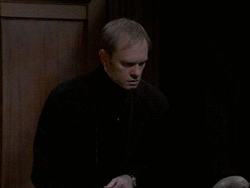
I guess according to JRoth there were legal reasons for changing his name from Zeke Shaw to Miles Shaw. I know this is hard for the fandom to accept as we’ve taken him into our bosom as Zeke. For a while it created some confusion for me because there’s a Deke Shaw on Agents of SHIELD. I’m getting old, I can’t even keep my dogs’ names straight, so maybe this is a good thing.
ANYHOO, Shaw and Raven get into a little cyber flirt when they both try to circumvent the other. Shaw is clearly impressed with our girl Raven, who, with style and panache, throws up her Raven symbol from season 3 to let us know she’s not messing around. MY GIRL GOT SHAW ON LOCK DOWN. This is Raven Reyes we’re talkin’ about. Child, please.
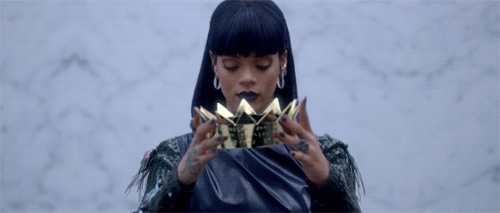
It’s apparent that Shaw isn’t exactly on Team Diyoza and has some sort of moral code. He doesn’t think outrightly killing folks is the best thing to do. I 100% believe he faked not being able to launch those missiles. Oh sweetie…do you know what show you’re on? Go check it out on Netflix and report back once you’ve realized that until you’ve racked up a body count into the hundreds, you ain’t shit.
One of the things we find out this episode is that there have been four Eligius ships. First one was unmanned, and exploratory ship. Second was a mining expedition, but undermanned for the job. Forth one, well we know it’s a mining vessel full of prisoners for all the hard labor. But Eligius III? All data is about that mission is encrypted. THERE’S A MYSTERY AFOOT!
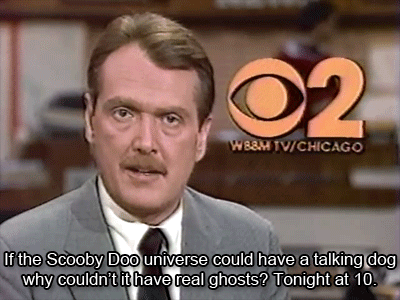
We know this ship had nightbloods on it…that was mentioned when Diyoza and Shaw saw Clarke’s blood. We can also assume it had cryosleep technology since both were created by Becca. But what happened to that ship? Why is all information protected? I love these little clues that keep getting dropped for us to mull over. I can tell you what most people think: ALIENS. Because at this point, why not?
I Can’t Stop Loving Diyoza. Sorry Not Sorry.
Am I still in love with Charmaine Diyoza? You bet your sweet ass I am. Last episode I thought that while dangerous and not to be fucked with, she was pragmatic and reasonable to an extent.
This episode she went back on her word to Bellamy, after working behind the scenes to circumvent his leverage. Not cool, Diyoza.
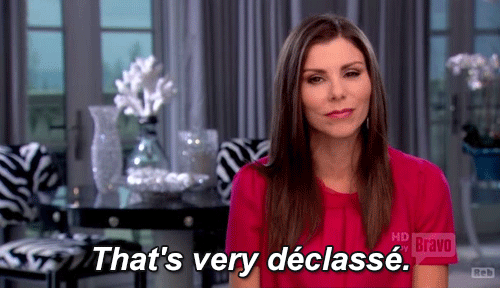
(that’s okay i still love you shhhhh don’t tell)
While 283 sleeping prisoners is a lot of people, what exactly do they mean to her? Why care about this group of people? She’s protective of them even before it’s apparent that there’s a big threat she needs to contend with in Wonkru. We don’t know if she’s aware at this point that they and Wonkru make up the last remaining contingent of humankind. Clarke never got through her whole story, so Diyoza’s concern over the 283 prisoners may have nothing to do with ensuring the continued existence of the human race and genetic diversity. What is it then?
You know, perhaps Diyoza just doesn’t have an off switch. She was a Navy SEAL, y’all. That’s INTENSE. Then she was a domestic terrorist…like DOUBLE INTENSE. Now she’s ostensibly the leader of this rag tag prisoner army, upon which she seems to impose some sort of rank and file to since Shaw takes orders from her and McCreary sometimes is a good boy and listens to her.
I still wanna know how she became the leader of all these murdery bad asses. I suspect she had a stare-down with the biggest dog in the yard and that big dog withered under her glare. Y’all…you see how she looks at people? You want her to look at YOU like that? She is S.E.R.I.O.U.S.
(omg i luv her)
While I was disappointed in her decision to renege on her deal with Bellamy, it didn’t surprise me one bit. I know what show I’m watching. Nobody calls splitsies on the one last patch of green on earth and sees that plan through!
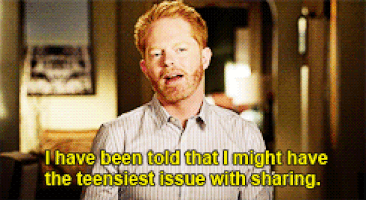
I loved her interaction with both Blakes, but her squaring up against Octavia was riveting. Diyoza sizing Octavia up was awesome. She’s so fucking cool under pressure and is assured that she’s the baddest bitch in the room. Octavia has a nice death pit and all, but she doesn’t have devastating sonic weapons that can break up rocks, destroy buildings, or turn humans into pink mist.
Let’s just say I am all about this Octavia/Diyoza face off. I think it’s positively delicious. Give me all the drama and conflict and tension (may some of it be sexual!) you can!
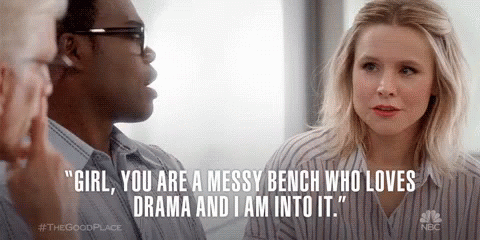
IT ME. It so very me. I AM A MESSY BENCH.
The Raven and the Cockroach
I love this dynamic so, so much. In my last review, I said that these two probably know each other the best at their core. There’s no pretense between these two because their bullshit detectors are set so high and each other knows it. They’re able to be honest and raw in a way I would never have thought possible after early seasons.
Murphy has this brilliant way of putting his foot in his mouth with people, but I love when he does it this episode with Raven and immediately recognizes he fucked up. It leads to some great dialog between these two, with Murphy willing to be the one that kills the prisoners, understanding that it’s something Raven is unable to do. And I love that about him. Not only did he stay behind because he wondered why Raven should be the one to sacrifice herself again, but he’s willing to bear the burden of actively killing 283 people.
When Murphy says he’ll pull the lever, we hear a distant roar from earth. It’s Clarke..
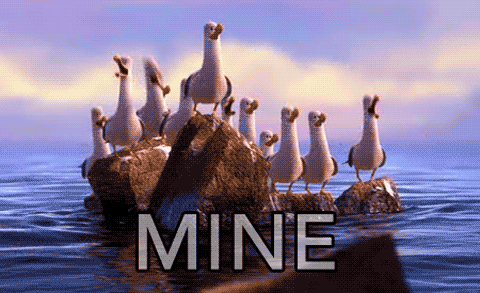
NO ONE TOUCHES THE LEVER. LEVERS BELONG TO CLARKE.
God, it’s like Murphy doesn’t even watch The 100.
When Raven and Murphy have to face death or self-preservation, they choose the later, but that means awakening all the sleeping giants. And those sleeping giants look like meanies! It’s going to get worse up on the Eligius before it gets better.
The Dark Year
Okay, but what if it’s just the year Octavia got REALLY into jam bands due to Kara’s awful influence and Kane was able to pull her out of it but now Octavia’s all like “don’t EVER mention Dave Matthews AGAIN!”?
Because, honestly, what’s darker than being into jam bands?
**I suddenly remember prog rock exists** nooooooooooooooooooooooooooooo…….
Being Bellamy Blake
Guys, did y’all think that Diyoza was really going to share half of Eden with Bellamy and co.?
I don’t know what Bellamy thought would happen either, but you go to war with the army you have, not the army you want. Do I think that Bellamy was naive enough to think things would go according to plan? No…he even says as much to Octavia when he says he doesn’t trust Diyoza. But leverage. He has it. Until he doesn’t.
Bellamy and Spacekru were never in much of a superior position to begin with, only banking on Diyoza caring about the prisoners still aboard the Eligius. But he knew he had Raven’s smarts and could bank on that to get him enough time to bargain with Prisonkru. There’s a fly-by-the-seat-of-his-pants quality to Bellamy’s plan that works where it can. Again, until it doesn’t.
I daresay I can’t think of a better improvisational plan to bargain for their lives with Diyoza than what he comes up with, and remember he has the counsel of Raven, Murphy, Echo, and the others to listen to. He does the best with what he has.
That Octavia immediately blames Bellamy for things going south is pretty much Octavia’s brand. To which I say:
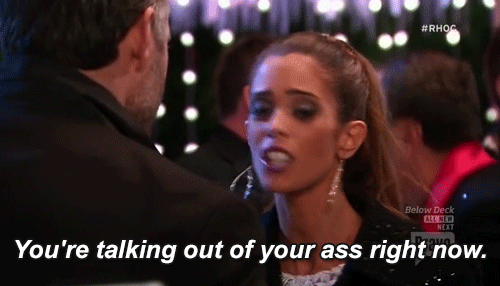
What other plan could have gotten Octavia and Wonkru out of that bunker? Was Bellamy to pull mining equipment out of his ass? I understand Octavia’s anger and frustration, but taking it out on Bellamy felt immature of her, a reminder that perhaps Blodreina is still very much an emotionally stunted girl who grew up under the floor and didn’t get the socialization she needed to properly and rationally address her situation with the appropriate reactions. She needed peer interaction, not Ovid and isolation.
I have a feeling this is going to be me to Octavia for much of the season:
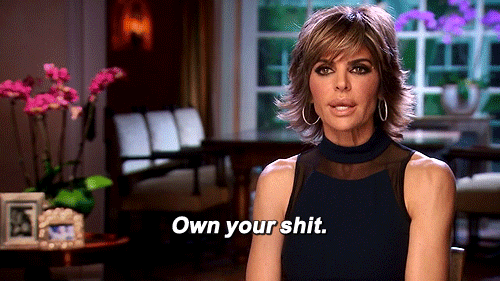
She’ll need to take responsibility not only for how she reacts to things, but for what she’s become and while her metamorphosis into this Red Queen might have saved lives, what did it turn those lives, including her own, into?
Put on a Pot of Coffee, We Goin’ to War!
We kinda knew from previews and whatnot that season 5 would be about a war for Eden. One garden…two serpents (we assume Octavia and Diyoza, but that seems almost too simplistic for now).
What’s interesting is two big forces are at play here, and neither of them are being directed or led by Clarke or Bellamy. Instead we have Octavia leading Wonkru and Diyoza leading Team Eligius. It’s strange to see Clarke on the sidelines of a conflict.
At the same time, it’s kinda nice to see Clarke in a position where she has to react instead of proactively make some sweeping decision that affects a great many people. With Madi to protect, her decisions are likely to be very personal and she may even back off from trying to assert herself as a leader.
Bellamy has been a leader, but seems he’ll get swept up in whatever Octavia is doing, trying his best to dissuade her from making mistakes along the way. What I don’t see happening is Bellamy getting through to Blodreina. I suspect there will be political in-fighting between those close to Blodreina and Bellamy. He might only have his sister’s well-being at the forefront of his mind now, especially if he sees she’s losing her soul to this Red Queen role she’s carved out for herself.
How Bell and Clarke figure into this war and what side(s) they come down on will likely lead to more juicy conflict. I’m here for it. You know I love this shit. I may scream obscenities at my TV while watching some of this shit play out, but that’s PASSION, folks.
No, For Reals Though, What In the Ever-Lovin’ Fuck Happened in the “Dark Year”?!
[indistinct screaming]
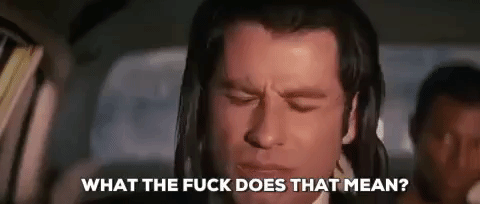
[more indistinct screaming]
Deathwatch 2018
From week to week, I’m ranking characters by likelihood two die in two buckets: gonna die and long shots. Dead characters of note are in the “May We Meet Again” category.
Not a lot of movement on my Deathwatch lists, but just a bit of solidifying of my gut instincts. Kane almost moved up, but I’d say he and Abby and neck and neck. They’re both hot messes, let’s be honest. I love Kabby, but they’ve seen better days.
Sure Bets, One of These Peeps Is Dyin’
Abby
Kane
Kara
Echo
McCreary
Loooooooooooooong Shots, Place Yer Bets!
Raven
Murphy
Ethan
Monty
Bellamy
May We Meet Again
Jaha – he was number 1 on my Sure Bet to die board, though I take no pleasure in being right…it was a sorta easy read based on social media. Jaha was an interesting, complex, often infuriating figure in this universe, so RIP.
Raven Reyes Nookie Watch 2018
Welcome back to Raven Reyes Nookie Watch 2018! Along with Deathwatch 2018, this is a recurring feature of upmost importance. It’s all about the nookie!
No nookie was acquired this episode, but we had a long-distance meet cute with Shaw. Hackers trying to hack and counter-hack one another may not be your cup of flirt tea, but it’s as close as Raven’s got to foreplay in six years. WE’LL TAKE IT.
RAVEN REYES NOOKIE ALERT LEVEL: There’s a wee thin crack in the ice
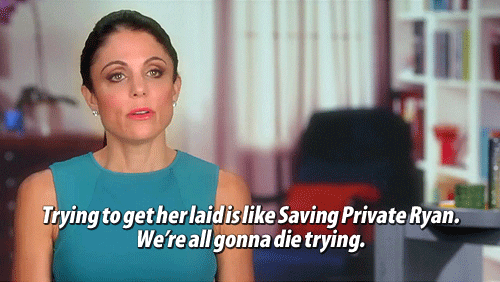
Private Jennifer, reporting for duty. Let’s do this!
Parting Thoughts
Slarke is my ride or die ship – that’s Clarke + soap. I’m concerned because she’s starting to look a bit grungy.
Where the rest of Spacekru and Madi at? I guess still over in Eden, which worries me now that Prisonkru has claimed it as theirs.
“No no no no no…you just opened Pantera’s Box!” – Nick Miller. I’ll miss you, New Girl.
I’m fuckin’ in love with Murphy’s hair.
Can someone help Raven with her ponytail? Those two long strands of stray hair make her look like an anime character.
WHERE IS NIYLAH?! I hope Wonkru didn’t eat her.
I already miss McCreary’s beanie.
Like, Miller calling Octavia “Blodreina” was weird, right? It’s not just me?
Do you think the Eligius III is still out there somewhere?
You’re goddamn right I used a Teddy Perkins GIF in this review. If I can’t sleep after seeing that Atlanta episode, you’re not either.
The dark year, tho…WHAT IS IT?!
TWEET/RETWEET: If you enjoyed this review, please share, retweet, or like it on twitter.
SPOTIFY PLAYLIST OF THE 100 MUSIC!: Hey people who like sounds entering your ear holes! I have a Spotify playlist, which is music from and inspired by The 100. You can find it right here and marvel at my musical tastes. I keep it up to date with anything featured on the show or in promos.
FINAL VERDICT!
“Pandora’s Box”: 9.0 out of 10 people bursting into pink mist…ewwww!
There are some The 100 reviewers/recaps/writers you should absolutely be reading, and I offer them up for your enjoyment; I have no affiliation with any of them, save for being a fan:
Selina Wilken – a mix of passionate fandom and truly professional journalism.
Erin Brown – unfairly beautiful writing. Like seriously, stop being so good.
McKenzie Morrell – recapping her damn face off and great interviews with the cast!
Toni_watches – piss your goddamn pants hilarious photo recaps.
Jo Garfein – great fandom charity auctions.
Disclosure: this is my own indie site. This is on my time, my dime. Becho is endgame.
Several months later…
You are Wonkru or you are the enemy of Wonkru. Choose.
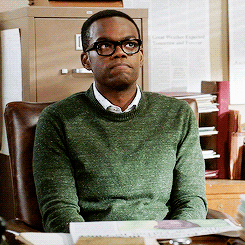
The 100 – “Pandora’s Box” Review and Analysis Yet another episode of The 100 where things go swimmingly, 100% according to plan, with no hiccups and DEFINITELY no wars being declared.
0 notes